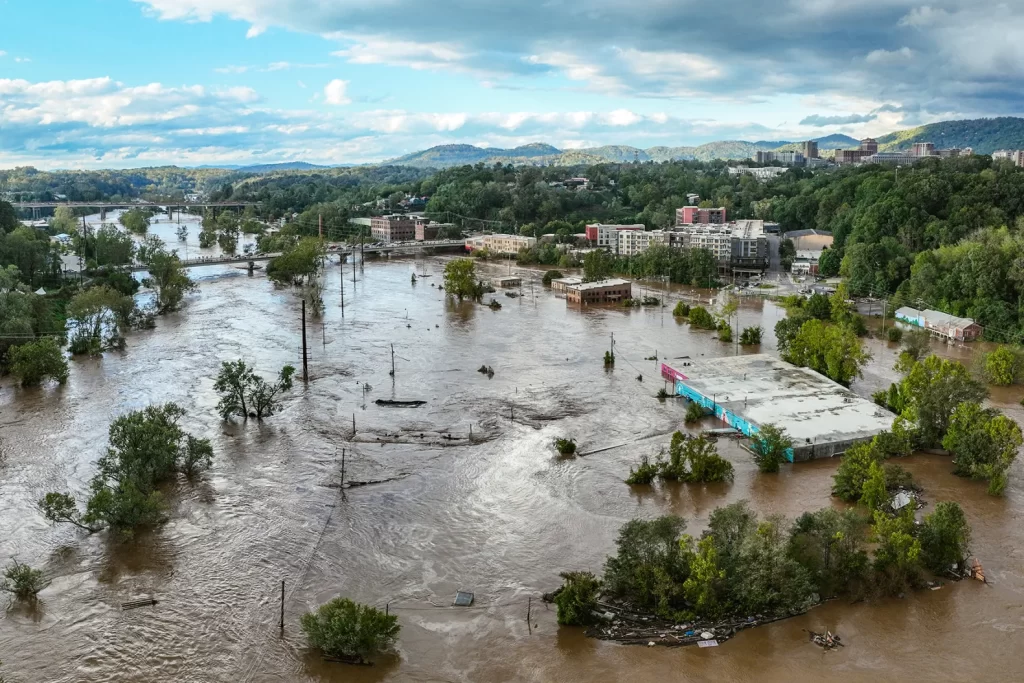By Peter Pavarini
“Remember Him before the silver cord is severed and the golden bowl is broken.”
-Ecclesiastes 12:6

In 2009, I read One Second After[i], a New York Times bestseller about life in a small town following an electromagnetic pulse attack on the United States. Similar to other post-apocalyptic science fiction (e.g., Suzanne Collins’ The Hunger Games[ii] and Cormac McCarthy’s The Road[iii]), William Forstchen’s novel appealed to people like me who find stories set in a dystopian future not only plausible but oddly entertaining.
Forstchen’s novel came to mind when Asheville, North Carolina and its environs were devastated by the wind and rain of Hurricane Helene a few weeks ago. I remembered his disturbing story had taken place in Black Mountain, NC, one of the towns ravaged by Helene.[iv] A charming community of 8,430 people nestled in the Blue Ridge Mountains, Black Mountain has long been popular with tourists and artists attracted by its natural beauty and friendliness. Although I’ve only visited the place a few times, my son and daughter-in-law recently considered living there had he accepted a job offer from an Asheville employer.
The Fragility of Life
As discussed in previous blogs, Colleen and I have owned a seasonal residence not far from Asheville for nearly 20 years. Fortunately, our mountain cottage escaped the worst of the storm’s fury. But the proximity of the death and destruction caused by Helene brought into sharp focus just how fragile our lives are.
Heavy rain is not uncommon in this part of the Southern Appalachians. One of the peaks in the Smoky Mountain National Park gets an average of 85 inches of rain annually. That much precipitation puts the region in league with other temperate rain forests. However, getting two feet of rain in just 48 hours[v] was unprecedented even by those meteorological standards.
Life is like a house of cards. One event – an inadvertent mistake, an ill-timed gust of wind, a bit of bad luck – can knock it down. In the absence of catastrophes, wars, political turmoil, and other adversities, there wouldn’t be much for historians to write about. We may prefer to remember the good times, but the bad times do more to define us. How we handle tragic events says more about our character than all the achievements we’d rather celebrate.
The Golden Lamp
At the top of this blog is a verse of Scripture I’ve always loved but never fully understood. Only in the context of when it was written by King Solomon does it make sense. Biblical scholars say the passage refers to a golden lamp suspended by a silver chain. When a single link in that chain snaps, the light of the lamp bowl is extinguished, and its beauty is lost. What an appropriate metaphor for what just happened in western North Carolina.
If you’re having trouble seeing life’s beauty at the present time, you’re certainly not alone. As the media continuously reminds us, most Americans believe the things are on the wrong track – a sentiment that seems to be common worldwide. However, it’s not hard to find reasons to be happy at this point in history.
Where to Find Life’s Fragile Beauty
Consider the following picture of the human cell’s intricate beauty.

Compared with the simple diagram of cellular structure I was taught in high school biology, today’s understanding of human anatomy seems infinitely more detailed. To me this is indisputable evidence of Intelligent Design.
At the other end of the spectrum, consider what we’ve recently learned about the cosmos. The European Space Agency has been busy creating a 3D map of the universe using photographs taken by the Euclid space telescope. The detail is breathtaking. If you haven’t already done so, you really should view the video posted on YouTube which shows the first 1% of what the project is expected to achieve.[vi]

Along the same lines, I got goosebumps watching recent tests of SpaceX’s reusable Falcon launch system.[vii] Even better is listening to the live audio of those who witnessed this technological feat earlier this month.[viii] I haven’t been this excited about space exploration since I watched black & white TV coverage of NASA launches back in the 1960s.
Human ingenuity may never be a match for the awesome power of nature. It’s foolish to think manmade technology will ever overcome the fragility of our mortal lives. However, we can still be joyful experiencing the majesty of things greater than us – forces over which we have little or no control. Torrential rainfall can instantly transform a normally benign landscape – peaceful mountains draped in iridescent mists – into a deadly flood zone. The lives of an unknown number of people can perish before the outside world even notices. And yet, the heroism and generosity of those who came to rescue and care for the victims says more about who we are as a people than the bureaucratic failures that tend to get the most media attention.
Overcoming Self-Indulgence
It’s easy to become absorbed by the slings and arrows of everyday life. Unless we lift our heads from staring at our phones and take the time to look up at the sky (or through the lens of a microscope) we will never escape the self-indulgence which defines the modern age. Being present in the moment leads to a deeper appreciation of what it means to be alive. As author Edward J. Stieglitz once said, “In the end, it’s not the years in your life that count. It’s the life in your years.”[ix]
[i] Forge Publishers (2009)
[ii] Suzanne Collins, Scholastic (2008)
[iii] Cormac McCarthy, Turtleback (2007)
[iv] Monica Kast, “Helene Left Me Stranded in North Carolina. “In the Midst of Tragedy, I Found Community”, Lexington Herald-Leader, October 3, 2024. As of this writing, at least 12 people from Black Mountain died because of Hurricane Helene.
[v] Spruce Pine, NC, another town hit by Helene received 24.12 inches of rain from the storm, only surpassed by Busick, NC which received 30.78 inches.
[vi] https://www.newscientist.com/article/2452099-first-breathtaking-images-from-euclid-telescopes-map-of-the-universe/
[vii] https://www.youtube.com/watch?v=gJPAtLaPhvw
[viii] SpaceTime with Stuart Gary (S27E127), October 21, 2024.
[ix] The quote had long been attributed to Abraham Lincoln, but in recent years that attribution has been disputed.

Be First to Comment